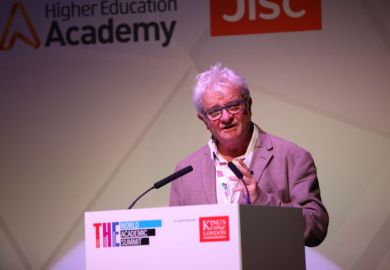Dominic Cummings’ departure from Downing Street and Rishi Sunak’s ambivalent attitude towards science spending help explain why the UK’s public research funder is facing cuts worth hundreds of millions of pounds despite government plans to increase research expenditure, sector figures have claimed.
News that UK Research and Innovation (UKRI) will see its government allocation for 2021-22 fall by £403 million to £7.9 billion − 5 per cent lower than 2020-21 levels − was met with dismay from research leaders last week. In addition, scientific infrastructure spending will be about £300 million lower compared with 2020-21, meaning UKRI’s overall budget will fall by £713 million, or 8 per cent.
Graeme Reid, chair of science and research policy at UCL, said that it was “difficult to reconcile recent funding announcements with government plans to make the UK a scientific superpower”.
The lower settlement was “primarily accounted for” by a £284 million loss from its Official Development Assistance (ODA) budget, according to UKRI, which has left funding in doubt for scores of projects funded by the Global Challenges Research Fund (GCRF) and Newton Fund.
There was, however, a glimmer of hope that ODA funding could return to previous levels from 2022 after Tory MPs threatened to stage a rebellion against multibillion-pound cuts to international aid.
Alison Phipps, co-director of a £20 million GCRF-funded hub on South-South migration, said that the “prospect of a reversal to the cataclysmic situation many leading academics and researchers at home and overseas have found themselves in [thanks to] these sudden cuts was welcome news”.
“The experience of cuts has already shown that their impact is profoundly damaging [to universities and researchers],” said Professor Phipps, who is based at the University of Glasgow. She said the curtailment of projects could set back efforts to alleviate poverty and improve girls’ education “by a decade”.
While many researchers may have expected the disappointing settlement, many had hoped that the government’s commitment to spend £22 billion a year on research and development (R&D) by 2024, up from £13.2 billion in 2020-21, would mean UKRI’s funding would continue to increase as it has in recent years.
One figure with knowledge of Whitehall said that the reduced settlement reflected how the chancellor, Rishi Sunak, was “not instinctively drawn to R&D spending”.
“Unlike [previous chancellors] George Osborne and Philip Hammond – who saw R&D expenditure as the first port of call for extra cash – Rishi Sunak sees other ways to boost economic productivity,” he told Times Higher Education.
Another figure involved with the research councils said UKRI’s reduced budget could be directly traced to the resignation of Mr Cummings as the prime minister’s chief aide in November, given his powerful advocacy for science while in office.
“For all his flaws, Cummings was a big champion for higher science spending – it’s hard to see these kinds of cuts happening if he was still in Number 10,” he told THE.
“His departure was particularly bad news for UKRI because everyone knows Ottoline Leyser was chosen as chief executive personally by Dominic Cummings, so she has lost a big ally in government,” he added.
Without his influence, the organisation could struggle for increased funding, even as overall public R&D expenditure increases, he warned: “Ottoline is a first-class scientist and excellent communicator, but she isn’t the Whitehall operator that [her predecessor] Sir Mark Walport was − and that’s the kind of person that UK science needs right now.”
Register to continue
Why register?
- Registration is free and only takes a moment
- Once registered, you can read 3 articles a month
- Sign up for our newsletter
Subscribe
Or subscribe for unlimited access to:
- Unlimited access to news, views, insights & reviews
- Digital editions
- Digital access to THE’s university and college rankings analysis
Already registered or a current subscriber?








